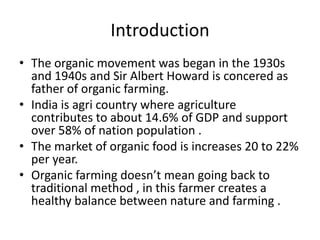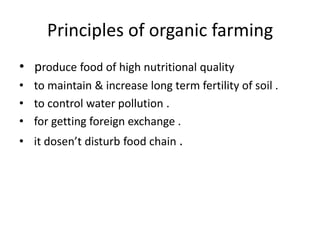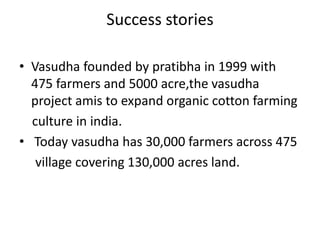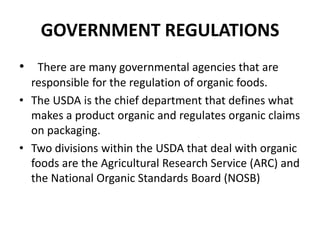Organic far
- 1. welcome
- 2. Title:- Organic Farming Movement-It Is Necessary or luxuries In Development Country like India. Presented By Arjun Sharma Vikram Shedge Janhavi Shinde
- 3. Introduction • The organic movement was began in the 1930s and 1940s and Sir Albert Howard is concered as father of organic farming. • India is agri country where agriculture contributes to about 14.6% of GDP and support over 58% of nation population . • The market of organic food is increases 20 to 22% per year. • Organic farming doesn’t mean going back to traditional method , in this farmer creates a healthy balance between nature and farming .
- 4. Why farm organically? • Organic farming provide long term benefits to people and environment. • Organic farming aims to increase long term soil fertility . • control pest & disease without harming environment . • need of organic farming in India arises due to unsustainability of agril. Production & damage to environmental system . • Ensure that water stays clean & safe .
- 5. Material used in organic farming • Compost (e.g. vermicompost , phospho-compost ) • biofertilizer (e.g. Rhizobium , Azatobactor , PSB) • Green manuring • Crop rotation • Trap cropping • New generation biotech organic inputs
- 6. Principles of organic farming • produce food of high nutritional quality • to maintain & increase long term fertility of soil . • to control water pollution . • for getting foreign exchange . • it dosen’t disturb food chain .
- 8. Market for organic produce • Some companies are came forward for export of organic produce as follows, • Weikfield product co. , pune • Tata tea pvt. Ltd. , Kerala • Amruta cashew industries , Sindhudurg • ajanta industries , Goa
- 9. • Some states which promotes organic farming as like sikkim going to be a 100% organically farming state. • In maharashtra Nashik , pune •
- 10. Success stories • Aditi Green Organic Farms Pvt Ltd Thane is the First Agriculture company to be run by a farmer and products supplied to the end consumer without Middlemen • Established in the year 2010 are engaged in producing and exporting pure & free from chemicals Organic Fruits and Vegetables.
- 11. Success stories • Vasudha founded by pratibha in 1999 with 475 farmers and 5000 acre,the vasudha project amis to expand organic cotton farming culture in india. • Today vasudha has 30,000 farmers across 475 village covering 130,000 acres land.
- 12. Disadvantages of Chemical Farming: • 1.Chemical fertilizers and pesticides: • a) Soil loses fertility. b) Destroys the biodiversity – pesticides destroy the other friendly creatures along with enemies of the crop. c) Increased expenses year after year. Since there is a need to use more fertilizer this year compared to last year • d) Polluted food – Food contains chemical residues. e) Degrades body health. f) Unnecessary dependency of farmers on corporate industry which produces the fertilizers and pesticides, destroying the self sufficiency of farmers.
- 13. ENDOSULFAN • . Endosulfan affects nervous system of even during gestational. • Endosulfan affects reproduction. • Endosulfan is genotoxic, cytotoxic and mutagenic.
- 18. AGNIHOTRA FARMING • As fertilizer you can use dung , compost or any other organic manure. Alongwith sowing make arrangements to perform sunrise –sunset Agnihotra on the farm. • To facilitate this, erect a small platform in the centre of the farm for performing both times Agnihotra regularly. • Right from sowing till harvesting Agnihotra has to be performed regularly on the farm. • Agnihotra Ash spray it on the entire farmland before sowing the crop. • The first experiment on Agnihotra Farming was conducted in village Mugaliyahat near Bairagarh, Bhopal in the year 1978.
- 19. GOVERNMENT REGULATIONS • There are many governmental agencies that are responsible for the regulation of organic foods. • The USDA is the chief department that defines what makes a product organic and regulates organic claims on packaging. • Two divisions within the USDA that deal with organic foods are the Agricultural Research Service (ARC) and the National Organic Standards Board (NOSB)



















